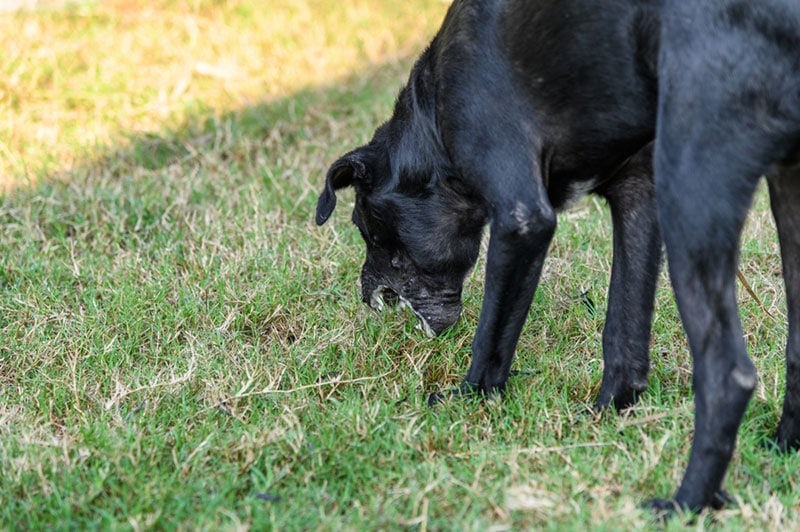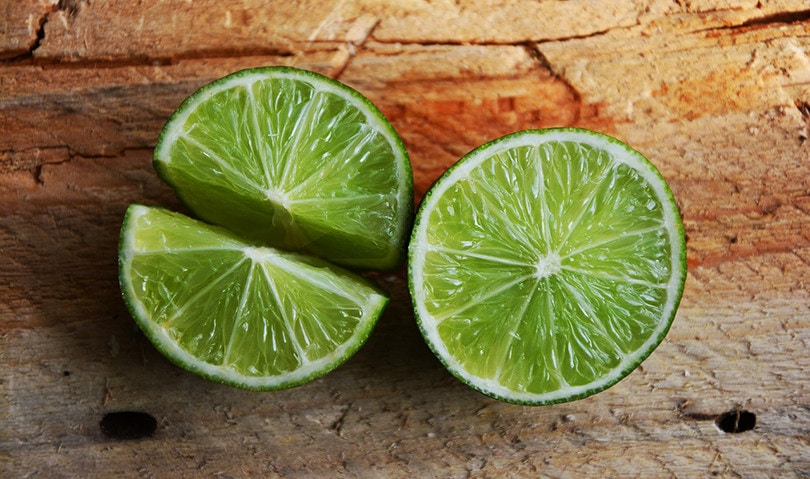Disclaimer: Before changing your dog’s/ cat’s diet or introducing new ingredients or supplements that they haven’t eaten before, especially when it comes to human food, make sure to consult your veterinarian first. Every dog/cat is different and requires an individual approach to nutrition, depending on their age, health, level of activity, and medical history. The guidelines offered in our article have been fact-checked and approved by a veterinarian but should be used as a mere guide on food safety, rather than an individual nutrition plan.
Some canines are extremely picky eaters. You can put the tastiest meal in front of them, and they’ll snub their nose and walk away. Others are voracious, devouring everything in their path. So if your dog has eaten a lime or you just want to gauge their reaction by squeezing something sour on their tongue, you did the right thing by checking to see if it’s safe.
When it comes to limes, it would be best if you steered clear of this green citrus fruit for your dog. Not only can the higher acidity in limes upset your dog’s stomach, but they can also be toxic in certain instances. Let us explain.
Call Your Vet
This article is in no way a substitution for professional veterinary guidance. The truth is, the fruit flesh portion of the lime is bitter but not usually problematic. The skin and stems are a different story. These toxic portions can cause gastrointestinal upset and more.
If your dog has consumed a lime, and you are unsure how much and exactly what they ingested, call poison control or your vet for advice. It’s always better to be safe than sorry.

Dogs Should Not Eat Limes
Plainly and simply, dogs just shouldn’t eat limes. There is no nutritional value in lime that they don’t already get from their standard diet, so there’s no reason for them to have it in the first place. Next, they likely won’t enjoy the taste, as it is bitter and pungent.
If they do eat limes, they might be in misery for sure. But the reality is, you might also, due to cleaning up unexpected messes. The effects of eating limes can cause body fluids from both ends that you might have to clean up—and no one wants that!
Why Dogs Shouldn’t Eat Limes
While limes have certain health benefits for humans, dogs won’t reap any reward from this fruit. Limes contain nothing your dog needs that they can’t get elsewhere through diet, supplements, and treats.
Limes are quite tangy, and they make us make a sour face. So you might want to squeeze a little lime juice in your dog’s mouth just to see what kind of response you get. Or maybe your dog is just being nosy, and you want to give them a taste so they know to leave you alone.
No matter your original reason for the question, here are some more in-depth details on why your dog shouldn’t have limes.
1. Limes Can Upset the GI System
If your dog eats limes, it can upset their gastrointestinal system, especially if they eat large quantities.
If the lime disagrees with your dog’s stomach, you might notice vomiting, diarrhea, and general upset. It can be even worse if they have peelings, leaves, or stems.

2. Lime Skins, Leaves, and Stems Are Toxic
According to the ASPCA, limes are toxic to cats, dogs, and horses. If you gave your dog a taste of the fruit portion or just the juice itself, they might suffer a little stomach discomfort, but otherwise, be fine.
However, if they ate any part of the skin or stems, that’s when trouble could set in. Lime poisoning occurs when your dog consumes any of these parts and can vary in severity.
Limonene, found in the peel, causes vomiting and in higher doses tremors, weakness and low body temperature. Psoralens are also found in the plant which, in livestock, makes the skin sensitive to light; this could potentially occur in dogs. Linalool, also found in the plant, has been shown to be toxic in other species and could potentially be harmful to dogs.
3. Fungal Toxin
If your dog has eaten some limes that have fallen off a tree or are decomposing in a compost bin, they may have inadvertently ingested some fungus. Certain fungi secrete toxins that are harmful to dogs. If your dog has ingested a large amount of not-so-fresh limes it is worth contacting your veterinarian straight away.
Signs of Lime Toxicity
While it is unlikely that your dog will eat any of the skin or stems, it’s important to know that they can cause toxicity. So, if you are still determining exactly how much your dog consumed, here is what you need to know.
- Nausea
- Vomiting
- Diarrhea
- Lethargy
- Weakness
- Tremors
Remember that some of these signs can spawn from the consumption itself, as it irritates your dog’s belly. So, it can be hard to tell the difference, and you shouldn’t try to self-diagnose. If you see any of the above signs after your dog eats a lime, contact your vet right away to get ahead of the issue.

Other Toxic Fruits for Dogs
Now that you know lime carries toxicity risks, what other fruits should you avoid?
- Avocado
- Any fruit pits and seeds
- Rhubarb
- Grapes/raisins
- Grapefruit
- Unripe Tomatoes
- All citrus rinds
Conclusion
Now you understand that the outer parts of the lime are toxic to dogs. The inner fruit is not toxic, but it can cause gastrointestinal upset. If your dog shows any signs of toxicity after eating a lime, it’s best to go ahead and contact your veterinarian, just to be safe.
So, if you want to give your dog a squirt of lime— don’t, and keep the lime out of reach.
Featured Image Credit: congerdesign, Pixabay











